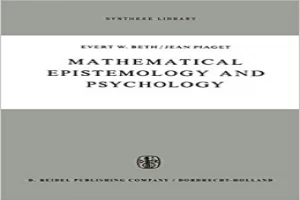Newly released
This book is new and will be uploaded as soon as it becomes available to us and if we secure the necessary publishing rights.

Mathematical Epistemology and Psychology Book PDF
(0)
Author:
Jean PiagetNumber Of Reads:
93
Language:
English
Category:
Social sciencesSection:
Pages:
342
Quality:
good
Views:
1265
Quate
Review
Save
Share
New
Book Description
One of the controversial philosophical issues of recent years has been the question of the nature of logical and mathematical entities. Platonist or linguistic modes of explanation have become fashionable, whilst abstrac tionist and constructionist theories have ceased to be so. Beth and Piaget approach this problem in their book from two somewhat different points of view. Beth's approach is largely historico-critical, although he discusses the nature of heuristic thinking in mathematics, whilst that of Piaget is psycho-genetic. The major purpose of this introduction is to summarise some of the main points of their respective arguments. In the first part of this book Beth makes a detailed study of the history of philosophical thinking about mathematics, and draws our attention to the important role played by the Aristotelian methodology of the demon strative sciences. This, he tells us, is characterised by three postulates: (a) deductivity, (b) self-evidence, and (c) reality. The last postulate asserts that the primitive notions of a demonstrative science must have reference to a domain of real entities in order to have significance. On the Aristote lian view discursive reasoning plays a major role in mathematics, whilst pure intuition plays a somewhat subordinate one.
Jean Piaget
Jean Piaget was a Swiss psychologist, born on August 9, 1896, in Neuchâtel, Switzerland. His first interest in zoology, when he was a young man and published an article in which he talks about his observations on the albino, has written many publications regarding mollusks and won the admiration of many, and by 15 years she had gained fame among European zoologists, as he studied zoology and philosophy and obtained He received his Ph.D. from the University of Neuchâtel in 1918. The psychologist and geneticist is best known for his theory of cognitive development, which looked at how children develop intellectually. Before his theory, children were seen as small adults, but Piaget proposed the idea that children think very differently. About the way adults think, and this theory has influenced developmental psychology and became a branch of it, and contributed greatly to the field of education, and was known as a pioneer in the constructivist theory, which indicates that people build their knowledge Actively drawing on their ideas and experiences, he began to show an interest in the natural sciences at an early age, at the age of eleven, beginning his work as a researcher when he wrote about the albino.
Read More
Book Currently Unavailable
This book is currently unavailable for publication. We obtained it under a Creative Commons license, but the author or publisher has not granted permission to publish it.
Rate Now
5 Stars
4 Stars
3 Stars
2 Stars
1 Stars
Mathematical Epistemology and Psychology Quotes
Top Rated
Latest
Quate
Be the first to leave a quote and earn 10 points
instead of 3
Comments
Be the first to leave a comment and earn 5 points
instead of 3